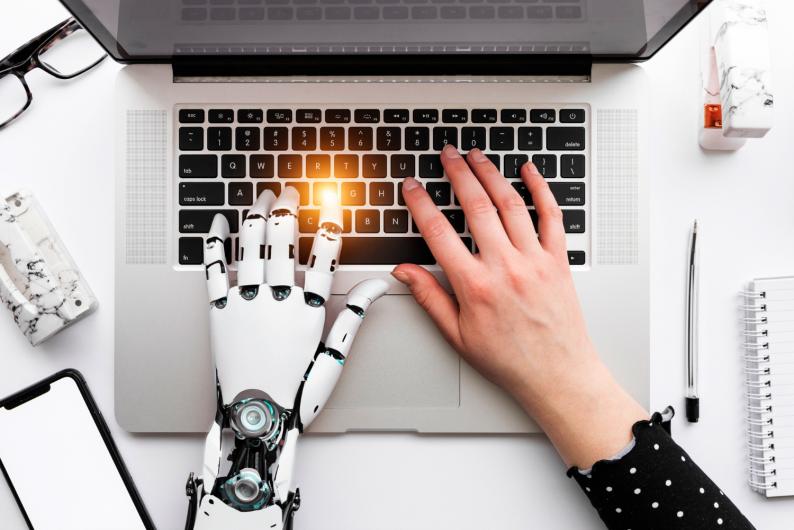
The world of artificial intelligence is evolving at an unprecedented pace, reshaping industries and altering the way we interact with technology. But what does the future hold for AI development? As we delve into this intriguing topic, we’ll explore the transformative potential of AI, its diverse applications, and the role of AI development companies in shaping this future.
The Transformative Potential of AI
Artificial intelligence is not merely a buzzword; it’s a powerful tool that has the potential to revolutionize industries across the globe. From healthcare to finance, AI is enabling businesses to analyze vast amounts of data, automate processes, and make more informed decisions. Consider the analogy of a skilled craftsman with a versatile toolkit. Just as the right tool can make a complex task manageable, AI can simplify and enhance various business operations.
In the healthcare sector, AI is already making waves by assisting in early diagnosis and personalized treatment plans. Imagine a world where diseases are detected before they manifest, saving countless lives. This is not science fiction; it’s a glimpse into the future of AI development. But how do we ensure that AI is used ethically and responsibly? The answer lies in establishing robust governance frameworks and ethical guidelines that prioritize transparency and fairness.
Diverse Applications Across Industries
The applications of AI are as diverse as they are promising. In the automotive industry, self-driving cars are no longer a distant dream. These intelligent vehicles rely on AI algorithms to navigate roads safely and efficiently, potentially reducing traffic accidents and emissions. But what about the impact on employment? While AI may alter job landscapes, it also opens up new opportunities for skilled professionals to design, implement, and maintain these advanced systems.
In the realm of finance, AI-driven algorithms are transforming how we manage investments and detect fraud. By analyzing patterns and anomalies, AI can provide insights that traditional methods might miss. The benefits are clear, but the challenge lies in ensuring data privacy and security. As financial institutions increasingly rely on AI, they must implement rigorous measures to safeguard sensitive information.
The entertainment industry is another area where AI is making a significant impact. From personalized content recommendations to realistic virtual characters, AI is enhancing user experiences and pushing the boundaries of creativity. How will this influence the way we consume media in the future? As AI becomes more sophisticated, the possibilities are virtually limitless.
The Role of AI Development Companies
As AI continues to evolve, the role of AI development companies becomes increasingly crucial. These companies are at the forefront of innovation, creating and refining the algorithms and systems that power AI technologies. One such company is Addepto, a leader in AI and data science solutions. Addepto’s expertise lies in harnessing the potential of AI to deliver tailored solutions that address specific business needs.
The partnership between businesses and AI development companies is akin to a symbiotic relationship. While companies provide the domain knowledge and context, AI developers bring technical expertise and innovation. This collaboration results in solutions that are not only effective but also aligned with the strategic objectives of the business.
AI development companies also play a pivotal role in addressing the ethical and societal implications of AI. By fostering an environment of transparency and accountability, they help build trust in AI systems. Additionally, these companies are instrumental in educating stakeholders about the capabilities and limitations of AI, ensuring that expectations are realistic and grounded in reality.
Ethical Considerations and Challenges
As we embrace the potential of AI, it’s essential to address the ethical considerations and challenges that accompany its development. One of the primary concerns is bias in AI algorithms, which can perpetuate existing inequalities if not properly managed. How can we create AI systems that are fair and impartial? The solution involves diverse data sets, rigorous testing, and continuous monitoring to identify and mitigate bias.
Another challenge is the transparency of AI systems. As AI becomes more complex, understanding its decision-making processes can be difficult. Imagine navigating a maze with invisible walls; without clear visibility, it’s challenging to predict outcomes. To address this, developers must strive for explainability in AI, ensuring that users can comprehend and trust the technology.
Moreover, the rapid advancement of AI raises questions about accountability. In scenarios where AI systems make autonomous decisions, determining responsibility can be complex. Establishing clear guidelines and frameworks is crucial to ensure that there is accountability at every stage of AI deployment.
The Future Landscape of AI
Looking ahead, the future landscape of AI is both exciting and challenging. As AI development continues to progress, we can expect even greater integration into our daily lives. From smart cities that optimize resource use to intelligent personal assistants that anticipate our needs, AI will become an indispensable part of modern living.
However, this future also demands collaboration and adaptability. Policymakers, businesses, and AI developers must work together to navigate the evolving landscape, addressing challenges and seizing opportunities. By fostering a culture of innovation and responsibility, we can unlock the full potential of AI while safeguarding societal values.
In conclusion, the future of AI development is a tapestry of possibilities, woven together by the threads of innovation, collaboration, and ethics. As we stand on the brink of this new era, it’s crucial to embrace the transformative power of AI while remaining vigilant about its implications. Through responsible development and thoughtful implementation, we can shape a future where AI serves as a force for good, enhancing our lives and empowering our societies.